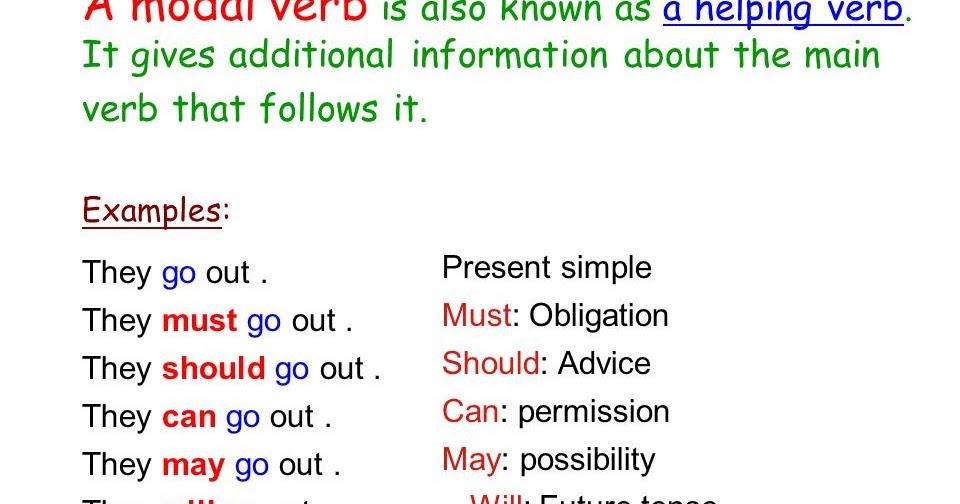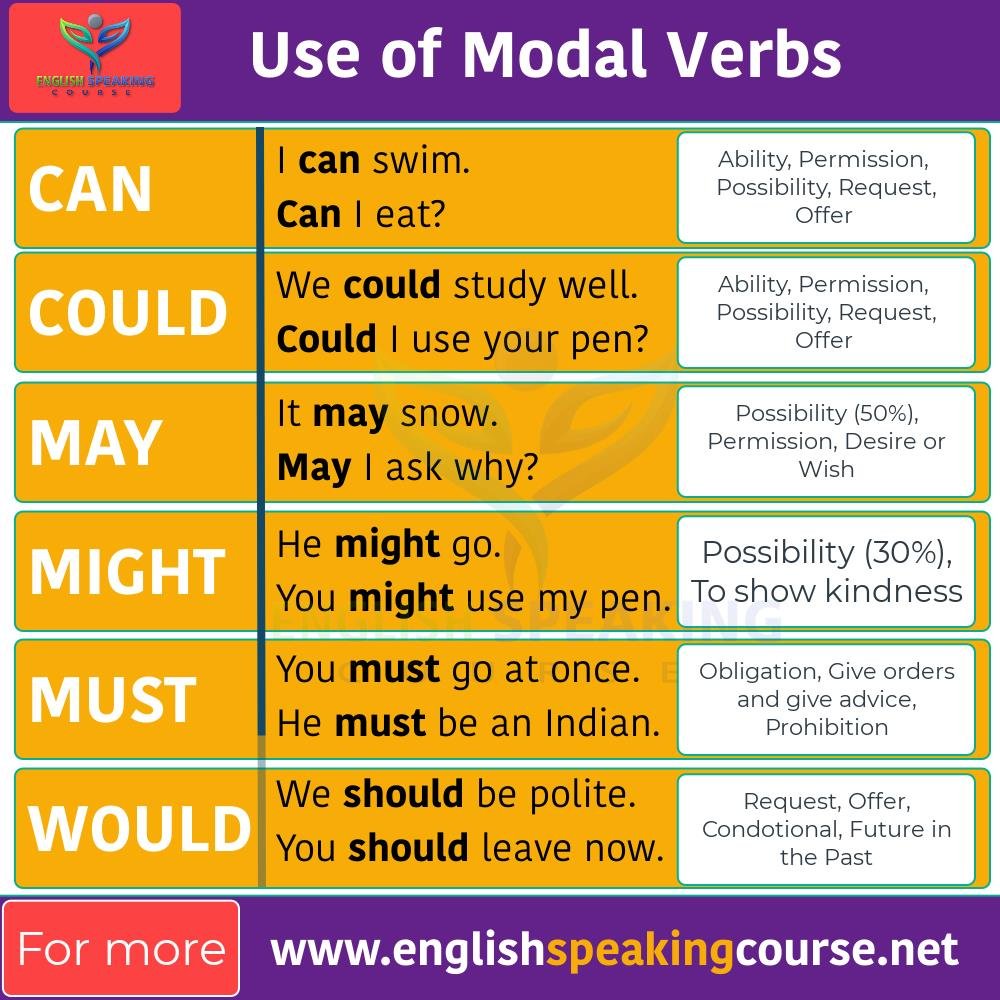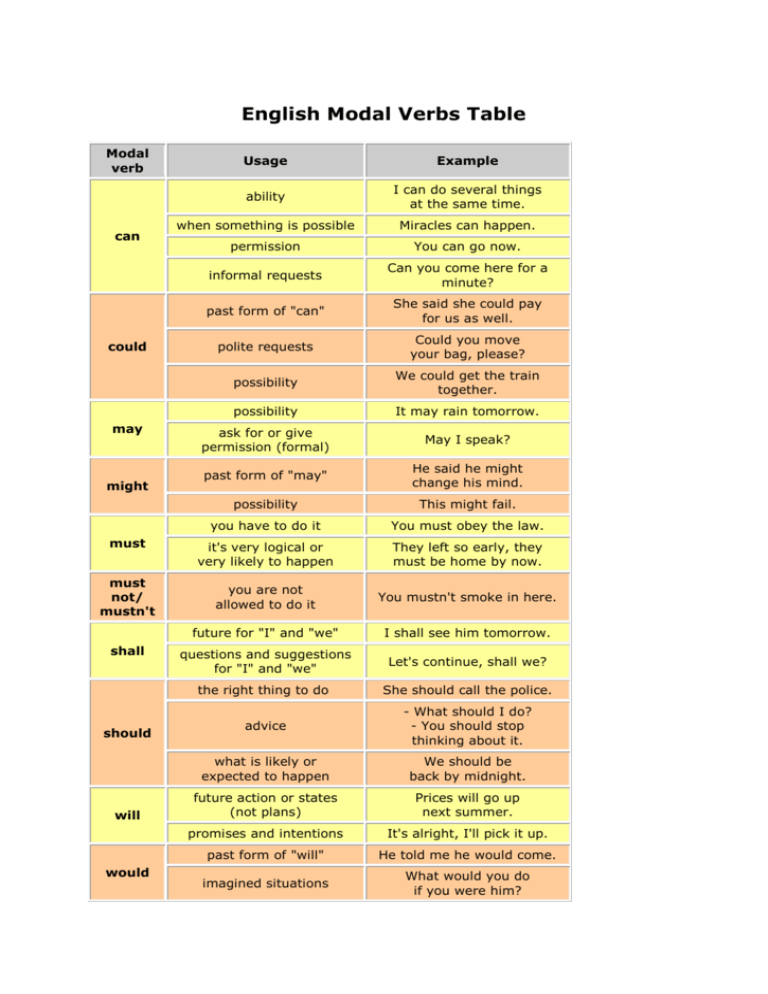Modal verbs, also called modals or modal auxiliary verbs, are verbs placed in front of main verbs and add meaning. The meaning that modal verbs add include ability, possibility, certainty, permission, requirements, suggestions, and advice. This means that we do not add -ed or -ing at the end of a modal verb. Modal verbs are so common that most English speakers don't even know what the grammatical name for them is. Note that modal auxiliary verbs are a type of auxiliary verb. Auxiliary verbs encompass tenses, aspects, modality , voice, emphasis and so on.
There are many other category of verbs in English like phrasal verbs. In this ESL skills course you can learn natural English phrases. Learn even more about English grammar in this introduction to grammar course.
Modal verbs are types of auxiliary verbs which express necessity, ability, permission or possibility. We also use them to make requests and offers. The most common modal verbs are can, may and must. Modal verbs don't have a past form and a past participle . You can only use them with the present tense. When you use other tenses you have to replace them.
Modal auxiliary verbs are used to show a necessity, capability, willingness, or possibility. Unlike most verbs, there is only one form of these verbs. Typically, verb forms change to indicate whether the sentence's structure is singular or plural. Most verbs also indicate whether something happened in the past, present, or future.
This is not the case with most modal auxiliary verbs, which makes them simpler to understand and use correctly. In English, modal verbsare a small class of auxiliary verbs used to express ability, permission, obligation, prohibition, probability, possibility, advice. Modal verbs are special verbs in the English language. You may already know that they can express ability, permission, possibility, obligation, or give advice. In this posting I talk about different uses for the modal verbs you may already know.
I show you haw to use these verbs to express deductions , expectations, and preferences. I will include many example sentences. The download at the end will give you additional practice using these verbs.
The modal verbs in English grammar are can, could, may, might, must, need not, shall/will, should/ought to. They express things like ability, permission, possibility, obligation etc. They do not take -s in the simple present and they do not have a past simple or past participle form. However, some modal verbs have alternative forms that allow us to express the same ideas in different tenses.
This activity will get students up and moving while they practice what they have learned about modal auxiliary verbs. In English, the modal verbs are used to express ability, possibility, permission or obligation. Each one of the modal verbs can be used to express one or more of these modalities. They can also be used to form the future tense in English and to make conditional sentences. As if English wasn't hard enough to learn, modal verbs complicate things even further. There are a lot of irregularities in the English language that can be confusing to students learning it as a second to their native tongue.
English and other Germanic languages, however, utilize modal verbs to help express a function and are vital to gaining command of the English language. Modal auxiliary verbs like can, may, ought, shall, and wood are used to suggest an impending or possible upcoming action. Learn to identify modal auxiliary verbs, understand their purpose, and indicate past tense with the provided examples. In this week's Teacher's Corner, students work together to rewrite sentences that use either simple or phrasal modals.
This activity is a great way to draw attention to modals, to their different forms, and to how those different forms can create slight differences in meanings. In this month's Teacher's Corner, we present four activities that focus on the form, meaning, and use of modals in everyday English. The activity offered in Week 1 uses common classroom instructions to help learners differentiate between modals expressing necessity and those expressing possibility.
Week 2 gives learners a chance to recognize equivalent simple and phrasal modals. In Week 3 an activity explains how to teach a common speech act. We end the month with a common icebreaker activity adapted to emphasize modals. Modal verbs are auxiliary verbs (also known as "helping verbs"). Normally modal verbs cannot work alone and must work with a main verb. The so-called "semi-modals" work partly like modals and partly like main verbs.
VerbTom and Suemightarrivelater.Everyonecanswim.In questions, the word order changes to modal + subject + main verb. Here are some examples with Yes / No questions. All of these modal verbs must come before a verb to help express at least one of the modality examples listed above. In some cases, though they can be used to express more than one modality, but you'll see more on that in the following section. So, let's take a look at some example sentences and highlight how the modal verb is expressing modality and adding more information to the verbs that follow them.
Modal verbs are used to express ability, obligation, permission, assumptions, probability and possibility, requests and offers, and advice. Each modal verb can have more than one meaning which depends on the context of that sentence . This verb has many different possible uses. It can be used to talk about ability and permission in the past.
Also, just like the modal verb "can", the modal verb "could" can be used to make questions, requests, suggestions or offers, but in a more polite way. It can also be used to talk about possibilities, but not as strong possibility that the one expressed with "can". Prepared list of sentences using a wide range of modal auxiliary verbs . Since modal auxiliary verbs do not have a past tense form, we can use the modal auxiliary along with the word 'have' and a past participle. Past participles typically end in -d, -ed, -n, or -en, creating the past tense 'wished, looked, taken,' and so forth. Let's take a look at an example in the present tense.
Modal verbs, sometimes called modals, are auxiliary verbs . They express such things as possibility, probability, permission and obligation. An extension to this activity could have students writing their own sentences using simple or phrasal modals as they choose. Modals (can, will, should, etc.), also known as modal auxiliaries, are difficult to learn because they seem to function like a verb but don't follow the same rules. We will examine the forms, meaning, and use of modals in more depth.
Auxiliary use - You can only use modal verbs as auxiliary verbs, in order to modify the meaning of the main verb. The main use of the modal verb "will" is to form the future form of the verbs in English. When talking about demands and requests, the use of will sometimes is not as polite as other modal verbs. Write down all the sentences with modal auxiliary verbs. Indicate what type of modal auxiliary verb is used in each sentence.
As a modal verb, "should" has many important uses in the English language. It's used to give advice, to express what's right, and to recommend an action. Also, it's used to make predictions, but ones that are more uncertain than those with the other modal verbs. Its negative form is "shouldn't ". We can often choose between two modal verbs with similar meanings when we ask questions or make requests. One form is more polite than the other.
We use modal verbs to express ability, to give advice, to ask for and give permission, to express obligation, to express possibility, to deduce and to make predicitions. Each video comes with interactive captions—click any word for an instant definition and pronunciation. FluentU will also show you other videos that have the verb so you can learn how to use it in any context.
It's a great way to absorb the different uses of English modal verbs, which can get confusing. And you'll be actively building your English vocabulary at the same time. In English grammar, a modal is a verb that combines with another verb to indicate mood or tense. A modal, also known as a modal auxiliary or modal verb, expresses necessity, uncertainty, possibility, or permission. The nine main modal verbs express a range of meanings, which may differ very subtly. The main meanings, especially those used in formal English, will be summarised here.
However with modal verbs like have to or need to, we have to add the auxiliary do at the beginning of the question. And, in this case, the auxiliary verb do changes depending on the personal pronoun. We use modal verbs–verbs like can, could, and should–to talk about things such as ability, possibility, permission, or obligation.
And we use the passive voice to focus on the object of an action rather than the doer of the action. Modal verbs are a part of the larger category called auxiliary verbs which are verbs that cannot be used on their own. They need to be accompanied by another verb. Sometimes modal verbs are called modal auxiliaries.
The modal verb "might" is used to express possibility in the present or in the future. It can be used as the verb "may" most times, however, it often means that the event has less possibility of happening than when it's said using may. Its negative form, "might not " is used to talk about possibilities but in a negative way.
Look at the way these sentences indicate a possibility, necessity, capability, or willingness. The modal auxiliary verb is bold in these sentences. Turn their attention to the modals written on the board.
Explain that simple modals are single words while phrasal modals are phrases using the verbs be or have. Tell learners that the simple modals on the board can be matched to a phrasal modal. The two modals do not mean exactly the same thing, but they can be used in similar ways. Walk into a classroom in the United States, and you'll see a variety of posters stating different classroom rules and instructions for students. Some of these posters might include phrases such as raise hand to speak or don't interrupt another student. Even if there are no posters, most teachers have a list of classroom rules and instructions.
These rules are usually written as short phrases without modals; however, a modal is still implied. Modal adjectives and adverbs give more information about the probability or the frequency of an event. Modal adjectives can be placed before the main verb to indicate the modality of the verb, that is, its probability or frequency. Modal Verbs are auxiliary verbs and are always used alongside another main verb. Modal verbs and are used to indicate the modality of an event, that is, the likelihood of something happening.
We use the modal auxiliary verb should mainly to give advice or make recommendations, talk about obligation or talk about probability and expectation. Can and could are modal auxiliary verbs. Be able to is not an auxiliary verb .
We include be able to here for convenience. Modal verbs indicate possibility, obligation or ability. Read the following examples and explanations carefully.
We're a school dedicated to using the most modern methods to teach our students all the beautiful nuances English has to offer. The videos are organized by genre and learning level, so it's easy to find ones that work for you. For starters, you'll hear several modal verbs in this interview with musician Will.i.am.
You can check out the full video library for free with a FluentU trial. Modal verbs are auxiliary verbs and they do not take another auxiliary to form the negative or questions. After each sentence is read, the students must raise a card to indicate which type of modal auxiliary verb was used in the sentence. They may raise both the past tense card and another if both apply. Modal verbs are for example may, can, must, should, need.
They express an ability, permission, wish etc. to do something. (I may, can, must swim.) Many modal verbs cannot be used in all of the English tenses. That's why we need to know the substitutes to these modal verbs. To learn more details about modal verbs and how they express moods such as ability, possibility, necessity or other conditions, go to page 2. All modal verbs must be followed by a main verb in the base form except for ought which is followed by an infinitive. Part 1 explains the grammar of modal verbs and where they are placed in a sentence or question.






























No comments:
Post a Comment
Note: Only a member of this blog may post a comment.